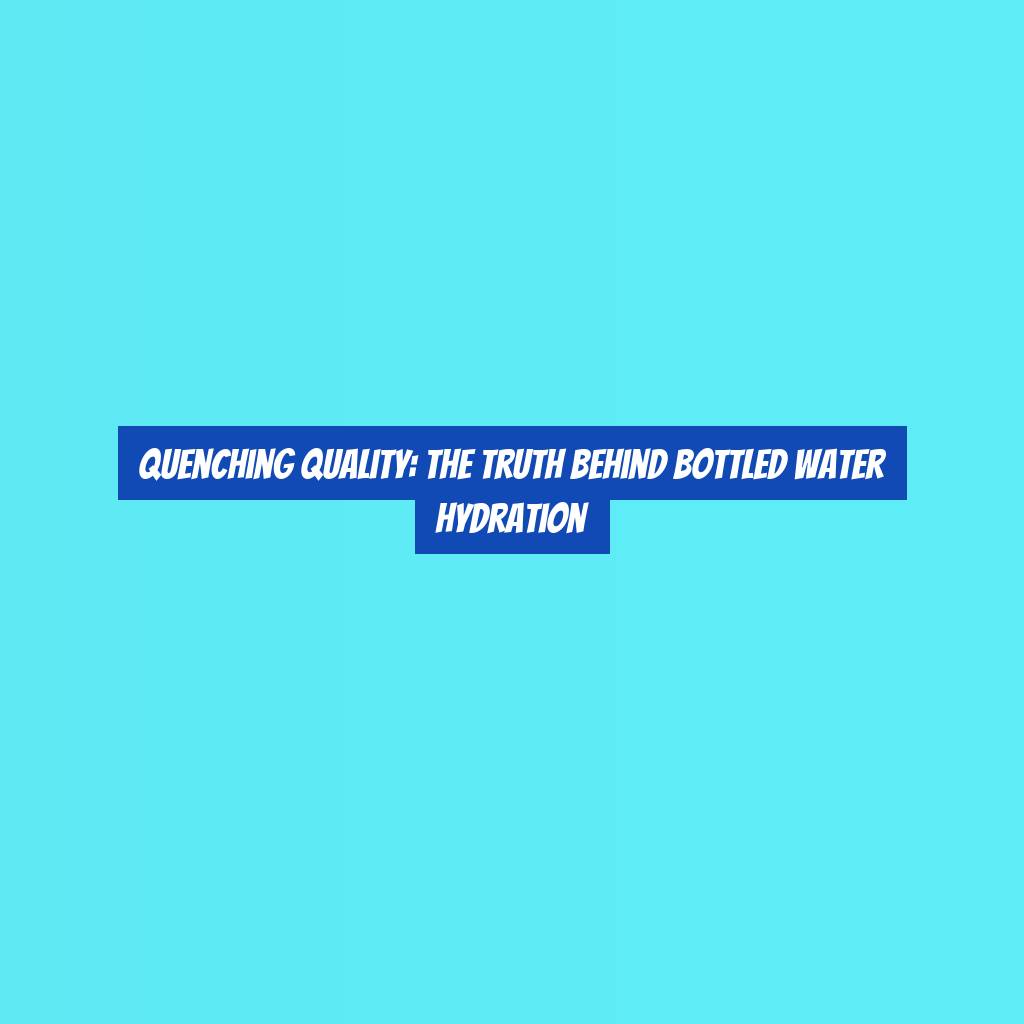Quenching Quality: The Truth Behind Bottled Water Hydration
Step right up and take a sip from the fountain of knowledge as we unravel the truth behind bottled water hydration.
You may have always assumed that reaching for a bottle of water was the epitome of healthy hydration, but have you ever stopped to consider if itG??s truly the best choice?
ThereG??s more to this seemingly simple act than meets the eye, and the answers may surprise you.
So, before you take another swig, itG??s time to uncover the hidden facts and make an informed decision about what youG??re really drinking.
Bottled Water Vs. Tap: Which Is Better?
When it comes to choosing between bottled water and tap water, youG??ll want to consider various factors that impact their quality and environmental impact.
Bottled water may seem like a convenient and safer option, but itG??s essential to delve deeper into the reality. Tap water is strictly regulated by the Environmental Protection Agency (EPA) and is required to meet stringent safety standards. On the other hand, the quality of bottled water can vary significantly. Some brands simply repackage tap water, while others may undergo additional purification processes.
Considering environmental impact, itG??s important to note that bottled water production consumes a substantial amount of energy and generates plastic waste. In contrast, tap water has a lower environmental footprint as it doesnG??t require the same level of packaging and transportation. Additionally, the plastic bottles used for bottled water can take centuries to decompose, contributing to pollution and landfill overflow.
When it comes down to it, tap water is generally the better choice in terms of quality and environmental impact. By investing in a reusable water bottle and utilizing water filtration systems, you can enjoy safe, high-quality water while reducing plastic waste.
Understanding Hydration Myths
To understand hydration myths, consider the impact of different beverages on your bodyG??s hydration levels. One common myth is that caffeinated drinks like coffee or tea dehydrate you. While caffeine does have diuretic effects, the amount found in a typical cup of coffee or tea isnG??t significant enough to cause dehydration. In fact, these beverages still contribute to your overall fluid intake.
Another myth is that only water counts towards your daily hydration needs. While water is an excellent choice, other beverages like milk, herbal teas, and even some fruits and vegetables also contribute to your hydration.
Additionally, the idea that you need to drink eight glasses of water a day isnG??t universally applicable. Your individual hydration needs depend on various factors like your activity level, climate, and overall health. ItG??s important to listen to your body and drink when youG??re thirsty.
Understanding these hydration myths can help you make informed choices about your beverage consumption and overall hydration.
The Science of Electrolyte-Infused Water
Electrolyte-infused water is formulated to help replenish essential minerals lost through sweating during physical activity. When you exercise, your body sweats, causing it to lose vital electrolytes like sodium, potassium, and magnesium. These electrolytes play a crucial role in regulating fluid balance, muscle function, and nerve signaling.
Electrolyte-infused water contains these minerals in specific proportions to aid in rapid rehydration and maintain proper bodily function.
During intense physical exertion, your bodyG??s electrolyte levels can become depleted, leading to muscle cramps, fatigue, and decreased performance. By consuming electrolyte-infused water, you can effectively replenish these essential minerals, allowing your body to recover more quickly and maintain optimal performance during your workout or athletic activity.
The addition of electrolytes to water enhances its ability to facilitate fluid absorption, ensuring that your body rehydrates more efficiently. This can be especially beneficial for individuals engaging in endurance sports or prolonged periods of physical activity.
Electrolyte-infused water offers a convenient and effective way to restore your bodyG??s electrolyte balance and support overall hydration, making it a valuable option for maintaining peak performance and recovery during exercise.
Environmental Impact of Bottled Water
Have you ever considered the environmental impact of consuming bottled water on a regular basis? The production and disposal of plastic water bottles contribute significantly to environmental pollution. Manufacturing plastic bottles requires large amounts of water and energy, while the transportation of bottled water consumes fossil fuels and emits greenhouse gases. Additionally, the disposal of these bottles leads to overflowing landfills and pollution of water bodies. The plastic used in these bottles takes hundreds of years to decompose, further exacerbating environmental issues.
Furthermore, the extraction of water for bottling purposes can deplete local water sources, impacting ecosystems and communities that depend on these resources. The bottling process also generates waste and pollution, harming natural habitats and wildlife. As a result, the environmental impact of bottled water consumption is substantial and canG??t be overlooked.
To mitigate these environmental consequences, consider using reusable water bottles and investing in water filtration systems. By opting for sustainable alternatives, you can significantly reduce the environmental footprint associated with bottled water consumption. ItG??s crucial to make informed choices that prioritize environmental preservation and sustainability.
Choosing the Best Bottled Water
When selecting the best bottled water, consider factors such as source, purity, and sustainability to make an informed and environmentally conscious choice.
The source of the water can indicate its quality. Look for bottled water that comes from natural springs or protected underground sources to ensure its purity. Some brands provide information about the specific source of their water, allowing you to make an informed decision.
Additionally, check for purity by looking at the label for any information on the filtration or purification process used. This can help ensure that the water is free from contaminants.
Sustainability is another crucial factor to consider. Look for brands that use eco-friendly packaging, such as recycled materials or bottles that are fully recyclable. Some companies also participate in initiatives to reduce their environmental impact, which is worth considering when making your choice.
Conclusion
So next time you reach for a bottle of water, consider the facts.
Tap water is just as safe and regulated as bottled water, and itG??s better for the environment.
DonG??t fall for hydration myths or fancy marketing – choose the best option for your health and the planet.
Stay informed, stay hydrated, and make the sustainable choice.





